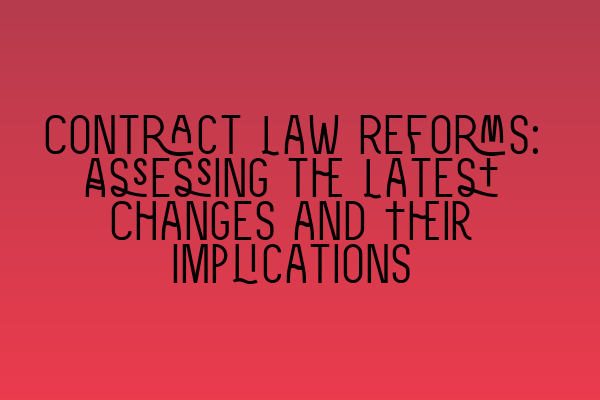Contract Law Reforms: Assessing the Latest Changes and Their Implications
Contracts form the backbone of business transactions, providing a legally binding framework for parties involved. Over time, the dynamic landscape of commerce necessitates regular updates and reforms to contract law. In this article, we will delve into the latest changes in contract law and examine their implications on businesses and individuals alike.
The Need for Contract Law Reforms
Contract law reforms are crucial in maintaining a fair and efficient legal environment for conducting business. It is essential to constantly evaluate the effectiveness of existing laws and adapt them to the evolving needs of contract parties. Failure to do so can result in outdated regulations that do not adequately protect the interests of all parties involved.
Let’s explore some of the recent significant changes in contract law and their potential implications.
1. E-Signatures and Digital Contracts
In the digital age, the use of e-signatures has become increasingly prevalent. Many jurisdictions have recognized the legal validity of electronic signatures, streamlining the contract signing process and enhancing efficiency. These reforms facilitate the execution of contracts, particularly in online transactions where physical signatures are impracticable.
Implication: Businesses can now expedite contract signing processes and reduce administrative costs associated with physical document handling. However, parties should ensure they understand the legal requirements for a valid e-signature in their jurisdiction.
2. Implied Terms
Implied terms are implicit obligations that arise in certain contracts, even if they are not explicitly stated. Recent reforms have clarified and codified certain implied terms, offering greater certainty and predictability in contract negotiations. These changes also aim to strike a fair balance of rights and duties between contracting parties.
Implication: Parties entering into contracts now have a more comprehensive understanding of their rights and obligations, reducing the ambiguity and potential disputes arising from implied terms.
3. Consumer Protection in Standard Contracts
Standard contracts, often presented on a “take it or leave it” basis, can significantly impact consumers. Contract law reforms have introduced more rigorous measures to protect consumers from unfair terms and practices in these agreements. These changes aim to level the playing field and redress the power imbalance between businesses and consumers.
Implication: Consumers are now better protected against unfair contract terms and practices, enhancing consumer confidence and trust in business transactions.
4. Good Faith Obligations
Acknowledging the importance of trust and fairness in contract relationships, recent reforms have emphasized the concept of good faith in contractual dealings. This principle requires parties to act honestly, fairly, and in good faith towards each other, fostering greater trust and cooperation.
Implication: Parties must now consider the principle of good faith when negotiating and performing contracts, potentially minimizing disputes and promoting more collaborative business relationships.
5. Alternative Dispute Resolution (ADR)
Contract law reforms have encouraged the use of alternative means to resolve disputes, such as mediation and arbitration, as viable alternatives to traditional litigation. ADR offers a more cost-effective, time-efficient, and mutually beneficial approach to resolving contractual disputes.
Implication: Parties now have more options for resolving disputes outside of the courtroom, potentially reducing litigation costs and maintaining business relationships.
Conclusion
Contract law reforms play a pivotal role in promoting fairness, efficiency, and legal certainty in business transactions. By understanding the latest changes and their implications, businesses and individuals can effectively navigate contractual relationships and mitigate potential risks.
As a solicitor specializing in contract law, I am well-versed in the recent reforms and their practical implications. If you require advice or assistance in navigating the complexities of contract law, do not hesitate to contact SQE Contract Law for expert legal guidance.
